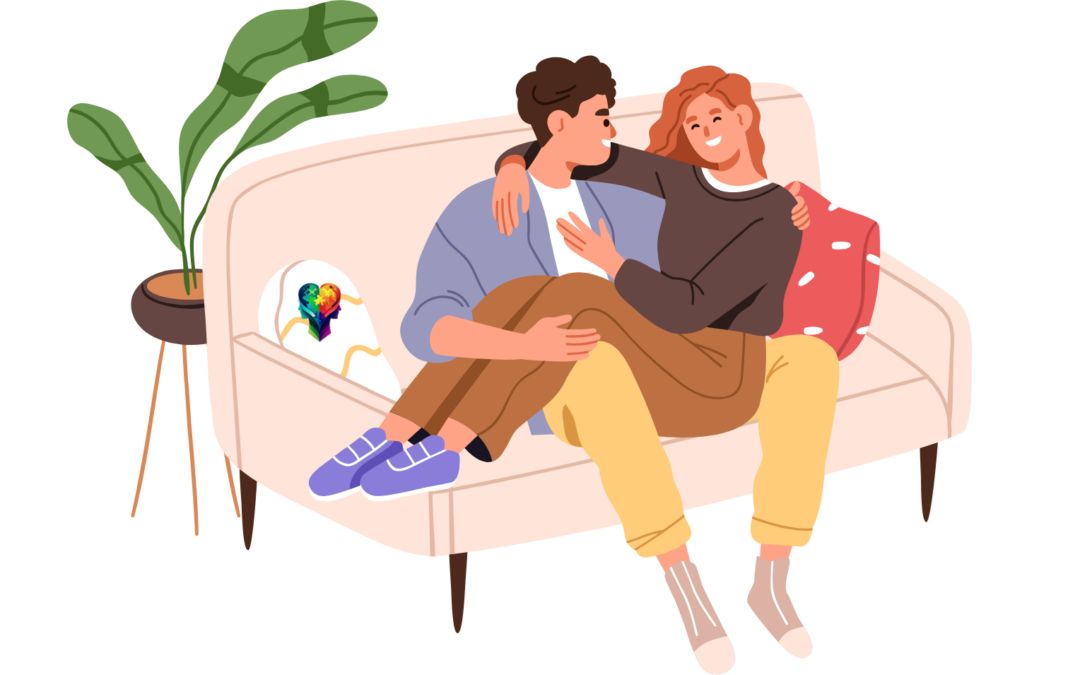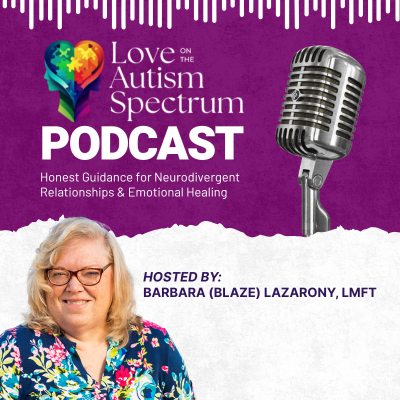Have you ever wondered how ADHD impacts relationships? Attention deficit hyperactivity disorder (ADHD) can significantly impact romantic relationships. For couples where one or both partners have ADHD, navigating the complexities of daily life can pose unique challenges. ADHD can also transform a partnership into a parent-child relationship, leading to strains such as emotional withdrawal and division of responsibilities.
In this blog post, we’ll delve into how ADHD impacts relationships and offer practical strategies for overcoming these hurdles, ultimately fostering a loving, supportive, and balanced partnership.
Key Takeaways
- Understanding the impact of ADHD on relationships requires both partners to be open and honest about symptoms such as inattention, impulsivity, emotional outbursts, and mood swings.
- Communication strategies like active listening and empathy can create a supportive relationship dynamic for couples with ADHD.
- Practicing self-care is essential for managing stress levels while establishing routines helps create a stable environment in an ADHD relationship.
Understanding Attention Deficit Hyperactivity Disorder (ADHD)
Attention Deficit Hyperactivity Disorder (ADHD) is a neurodevelopmental disorder characterized by symptoms of inattention, hyperactivity, and impulsivity. It is a common mental health condition that affects both children and adults, with approximately 8-10% of children and 4-5% of adults worldwide diagnosed with ADHD. This disorder can significantly impact daily life, including relationships, work, and social interactions.
ADHD symptoms can vary from person to person, but common symptoms include difficulty paying attention, following instructions, and completing tasks. People with ADHD may also experience hyperactivity, such as fidgeting, restlessness, and impulsivity, which can lead to reckless behavior and hurt feelings. Untreated ADHD can lead to difficulties in romantic relationships, as the non-ADHD partner may feel frustrated, ignored, and unappreciated.
It is essential to understand that ADHD is a legitimate mental health condition, not a personal failing or a result of poor parenting. The Attention Deficit Disorder Association (ADDA) emphasizes the importance of education, awareness, and support for individuals with ADHD and their loved ones. By fostering a better understanding of ADHD, we can create a more supportive environment for those affected.
The Effects of How ADHD Impacts Relationships
Adult ADHD, also known as attention deficit hyperactivity disorder, can profoundly impact various aspects of adult life, with romantic relationships being particularly susceptible. ADHD affects relationships through symptoms like inattention, impulsivity, and emotional volatility, which can strain the connection between partners. This strain can lead to a parent-child relationship dynamic, where the non-ADHD partner may feel as though they are caring for a child rather than being in an equal partnership. The early stages of a relationship with an ADHD partner might be filled with intense focus and affection, a phenomenon known as hyperfocus dating. However, as the relationship progresses, the non-ADHD partner may perceive a significant shift in their ADHD partner’s behavior as the hyperfocus fades, often interpreting this change as a personal affront.
ADHD and Distraction are all about the inability to stay focused!
Both partners in an ADHD relationship may experience a range of emotions. The ADHD partner might feel criticized and nagged, leading to avoidance and a lack of respect. On the other hand, the non-ADHD partner may feel neglected and insignificant, perceiving the ADHD partner as unreliable and unable to fulfill commitments. Often, the non-ADHD partner takes on a parental role due to the ADHD partner’s inconsistency and lack of follow-through, leading to an imbalance in household responsibilities and emotional resentment. This parent-child relationship dynamic can cause emotional withdrawal and division of duties, making the non-ADHD partner feel as though they are caring for a child rather than being in an equal partnership.
One of the defining symptoms of AHDH is dstraction. –Melissa Orlov
Overcoming these challenges requires both partners to comprehend the impact of ADHD on their relationship and collaboratively develop solutions to address issues and enhance communication.
Inattention and Forgetfulness
Inattention and forgetfulness are common ADHD symptoms that can cause hurt feelings, strain relationships, and create the perception of being unimportant to partners. The non-ADHD partner may feel ignored or unappreciated when the ADHD partner forgets essential dates or fails to follow through on promises. This can lead to mistrust and the belief that the ADHD partner is not genuinely committed to the relationship.
Addressing the issue of undiagnosed ADHD necessitates that both partners acknowledge inattention and forgetfulness as symptoms of attention deficit disorder (ADHD) rather than as a reflection of the ADHD partner’s sentiments towards the relationship. Open and honest communication can help both partners understand each other’s perspectives and work together to develop strategies for managing these symptoms. Consulting the Attention Deficit Disorder Association might provide valuable resources and support. This might involve setting reminders for important dates or using a shared calendar to keep track of commitments.
Impulsivity and Reckless Behavior
Impulsive and reckless behavior is another challenge faced by couples with ADHD. The ADHD partner may engage in risk-taking conduct or say hurtful things on impulse, leading to miscommunication and emotional turmoil. Such behaviors can create an unstable and unpredictable environment, causing tension, frustration, and conflict within the relationship.
Navigating these challenges demands a collaborative effort from ADHD and non-ADHD partners to set boundaries and devise coping strategies to handle impulsivity. For example, the ADHD partner might benefit from practicing mindfulness techniques to help them become more aware of their impulsive behaviors and tendencies and develop healthier ways to express themselves. The non-ADHD partner can also play a supportive role by offering understanding and patience, helping to create a more harmonious relationship dynamic.
Emotional Outbursts and Mood Swings
Emotional outbursts and mood swings are common in ADHD relationships, further complicating communication and emotional connection between partners. An ADHD partner may have difficulty regulating their emotions, leading to angry outbursts that leave the other person or non-ADHD partner feeling hurt or fearful. These episodes can impede partners from effectively communicating and sustaining a positive emotional bond.
Addressing this issue requires both partners to bolster their communication skills and devise strategies for effective emotional management. For the ADHD partner, this might involve seeking professional help in individual therapy to better understand their emotions and develop coping strategies. The non-ADHD partner can also benefit from learning techniques to diffuse tense situations and maintain a supportive and empathetic stance during emotional outbursts.
Being an ADHD Partner: Challenges and Rewards
Being in a romantic relationship with someone who has ADHD can be challenging, but it can also be gratifying. As an ADHD partner, you may face unique challenges, such as managing your partner’s symptoms, dealing with hurt feelings, and navigating the parent-child relationship that can arise in ADHD relationships. This dynamic can lead to resentment and a lack of appreciation for each other’s strengths, as the non-ADHD partner may feel burdened with responsibilities and emotional withdrawal.
However, with the proper support, understanding, and communication, you can build a strong and fulfilling relationship with your ADHD partner. It is essential to recognize that your partner’s ADHD symptoms are not a personal attack on you but rather a result of their brain chemistry and wiring.
By educating yourself about ADHD, its symptoms, and its effects on relationships, you can better understand your partner’s needs and develop strategies to support them. This may include helping your partner stay organized, managing stress and anxiety, and encouraging them to seek professional help.
As an ADHD partner, you may also experience rewards, such as increased creativity, energy, and spontaneity in your relationship. People with ADHD are often knowledgeable, passionate, and charismatic, making them exciting and engaging partners.
By embracing the challenges and rewards of being an ADHD partner, you can build a strong, loving relationship filled with laughter, adventure, and mutual support.
Communication Strategies for Couples with ADHD
Effective communication is vital in any relationship, but it becomes even more crucial when one or both partners have ADHD. As we’ve seen, ADHD can present various challenges in relationships, such as inattention, impulsivity, and emotional outbursts. To navigate these difficulties, couples with ADHD can benefit from employing communication strategies such as active listening, nonverbal communication, and conflict resolution. By honing these skills and applying them in their daily interactions, couples can foster a stronger emotional connection and work through the challenges that ADHD may present.
The best thing to spend on your relationship is time, conversation, understanding and honesty. –Unknown
A critical aspect of communication in ADHD relationships is understanding the disorder’s impact on each partner’s feelings and perceptions. The non-ADHD partner should know how their words and actions may create challenges and affect their ADHD partner’s emotional state. Similarly, the ADHD partner needs to recognize their symptoms and behaviors and be open to addressing them constructively. By gaining an understanding of each other’s perspectives, couples with mental disorders can develop more effective strategies to address issues and communicate more openly and honestly.
Active Listening and Empathy
As crucial communication skills, active listening and empathy can facilitate a better understanding of both partners’ perspectives and emotions. When practicing active listening, please give your full attention to your partner, ask them questions, and repeat what they’ve said to ensure you understand their message. Being empathetic involves validating the other person’s feelings and demonstrating genuine care and concern for their emotional well-being.
By incorporating active listening and empathy into their communication, couples with one partner with ADHD can foster a stronger emotional connection and create a more supportive relationship dynamic. These skills can help both partners feel heard and understood, ultimately reducing miscommunication and conflict and paving the way for a healthier and more balanced relationship.
Nonverbal Communication and Eye Contact
Nonverbal cues like eye contact and body language significantly contribute to expressing comprehension and support in ADHD relationships. Maintaining eye contact while listening to your partner can help demonstrate attentiveness and empathy, and being mindful of body language can help avoid sending mixed or negative signals.
Incorporating nonverbal communication techniques into daily interactions can help couples with ADHD create a more supportive and understanding atmosphere, ultimately improving the overall quality of their relationship. Both partners can foster better communication and mutual acceptance by being conscious of the nonverbal cues they send and receive.
Addressing Issues and Conflict Resolution
While conflict is an inherent part of any relationship, it poses unique challenges for couples with ADHD. Addressing issues and resolving conflicts constructively is crucial for maintaining a healthy and balanced relationship. This involves openly discussing concerns, actively listening to each other’s perspectives, and working together to find mutually agreeable solutions.
Couples with ADHD can benefit from learning and practicing conflict resolution techniques, such as staying calm, focusing on the issue at hand, and avoiding personal attacks. Couples can strengthen their emotional bond and create a more harmonious and supportive relationship dynamic by addressing problems and conflicts constructively and empathetically.
Managing Conflict and Emotions in ADHD Relationships
Conflict and emotional turmoil are common in relationships where one or both partners have Attention Deficit Hyperactivity Disorder (ADHD). The symptoms of ADHD, such as impulsivity, inattention, and hyperactivity, can lead to misunderstandings, hurt feelings, and frustration. However, with the right strategies and techniques, couples can learn to manage conflict and emotions healthily and constructively.
Recognizing Emotional Triggers
Emotional triggers are events, situations, or stimuli that can provoke strong emotional reactions in individuals with ADHD. These triggers can vary widely from person to person. Still, some common examples include feeling overwhelmed or stressed, being criticized or judged, feeling ignored or dismissed, being in a crowded or noisy environment, and experiencing sudden changes in plans or routine.
Recognizing these emotional triggers is crucial for managing conflict and emotions in ADHD relationships. By identifying what sets off intense emotional responses, individuals with ADHD can take proactive steps to avoid or prepare for these situations. This awareness can significantly reduce the likelihood of emotional outbursts and conflicts, fostering a more harmonious relationship.
Developing Healthy Coping Mechanisms
Healthy coping mechanisms are essential for managing conflict and emotions in ADHD relationships. These strategies can help individuals with ADHD regulate their emotions, reduce stress, and improve their overall well-being. Some effective coping mechanisms include:
- Exercise and Physical Activity: Regular physical activity can help reduce stress and improve mood, making it easier to manage emotions.
- Mindfulness and Meditation: Practicing mindfulness and meditation can help individuals with ADHD stay present and calm, reducing the likelihood of emotional outbursts.
- Deep Breathing and Relaxation Techniques: Deep breathing and progressive muscle relaxation techniques can help manage stress and anxiety.
- Creative Expression: Engaging in creative activities like art, music, or writing can provide an outlet for emotions and reduce stress.
- Social Support: Talking to a friend, family member, or therapist can provide emotional support and help individuals with ADHD process their feelings.
By developing and utilizing these healthy coping mechanisms, individuals with ADHD can better manage their emotions and reduce the likelihood of conflict in their relationships.
Navigating the Parent-Child Dynamic in ADHD Relationships
In ADHD relationships, the prevalent parent-child dynamic often leads to resentment and a lack of appreciation for each other’s strengths, with one partner adopting a parental role and the other a more dependent one. This parent-child relationship can contribute to marital dissatisfaction and dysfunction, as it erodes trust and intimacy, making it essential for couples to recognize and address it to maintain a balanced and equal partnership.
A parent-child dynamic with one or both partners having ADHD typically is at play in adult relationships with adults.
To navigate the parent-child dynamic, couples should foster open and honest communication, establish boundaries, and work together to manage household responsibilities and daily tasks. By breaking the cycle of this unhealthy dynamic, couples can create a more supportive and equal partnership that allows both partners to thrive.
Identifying and Breaking the Cycle
Breaking the parent-child cycle in ADHD relationships requires recognizing behavioral patterns and proactively intervening to disrupt negative cycles. Couples can benefit from:
- Enhancing communication
- Establishing boundaries
- Seeking therapy or counseling
- Creating coping strategies for both partners
By working together to identify and break the cycle, couples can establish a more balanced and equal partnership that fosters a healthier and more supportive relationship dynamic. This may involve:
- Reevaluating roles and responsibilities
- Setting mutual goals
- Prioritizing open and honest communication ensures that both partners feel respected and valued.
Focusing on Positive Aspects and Appreciation
Focusing on positive aspects and showing appreciation for each other’s strengths can help couples with ADHD maintain a healthy and supportive relationship. By expressing gratitude, celebrating successes, and acknowledging each other’s strengths, couples can foster a more positive atmosphere and create a stronger emotional bond.
Incorporating regular expressions of appreciation and positivity into daily interactions can help both partners feel valued and respected, ultimately strengthening the emotional connection and creating a more harmonious relationship dynamic. This might involve leaving thank you notes, planning special outings, or simply offering a heartfelt compliment.
Seeking Professional Help and Support
Seeking professional help and support can be invaluable for couples with ADHD, as it can provide guidance and resources to improve communication and understanding in the relationship. Both individual therapy for the ADHD partner and couples therapy can offer various benefits, such as helping the ADHD partner manage their symptoms, fostering improved communication, and establishing strategies for addressing conflict.
By seeking professional assistance, couples with ADHD can gain insight into their unique challenges and work together to develop effective strategies for navigating their relationship. Whether through individual therapy, couples therapy, or a combination of both, professional help can offer the support and guidance necessary for couples to thrive in the face of ADHD-related challenges.
I specialize in therapy and coaching for individuals and couples with ADHD, Autism, and Complex Trauma. My approach centers on helping clients understand their unique neurotype challenges and develop skills to navigate them effectively. Through our work together, I can help you foster a more meaningful connection with your partner, identify conflict areas, and create successful communication and resolution strategies. My goal is to provide the necessary tools so couples can build fulfilling relationships despite any obstacles they may be experiencing.
Individual Therapy for ADHD Partner
Individual therapy can provide the ADHD partner valuable insight into their symptoms and behaviors, helping them develop coping strategies to manage their ADHD more effectively. This may involve exploring the triggers of their symptoms, devising strategies for controlling them, and honing communication and problem-solving abilities.
By engaging in individual or family therapy, the ADHD partner can better understand how their disorder affects their daily life and relationships, ultimately contributing to a healthier and more supportive partnership. Access to individual therapy can be found through local mental health providers, online therapy services, or support groups.
Couples Therapy for Improved Communication and Understanding
Couples therapy can offer guidance, treatment, and support to both partners in an ADHD relationship, helping them improve communication, understanding, and mutual acceptance. Techniques used in couples therapy for ADHD relationships may include Imago Relationship Therapy, building ADHD-friendly relationship skills, and enhancing communication through active listening and trust-building exercises.
By participating in couples therapy, both partners can better understand one another’s perspectives and needs, allowing them to work together more effectively to address ADHD-related challenges. Through the guidance of a trained professional, couples can learn to navigate their relationship with greater empathy, compassion, and resilience, ultimately fostering a healthier and more balanced partnership.
Strategies for Maintaining a Healthy Relationship with ADHD
For couples seeking to thrive amidst the unique challenges posed by ADHD, it’s key to implement strategies that promote a healthy relationship. Establishing routines, balancing responsibilities, and practicing self-care can create a supportive and nurturing environment that fosters a strong emotional connection and a balanced partnership.
To maintain a healthy relationship with ADHD, couples should prioritize open and honest communication, recognize and address any negative cycles or dynamics, and focus on each other’s strengths and positive qualities. By taking a proactive approach to managing the challenges presented by ADHD, couples can create a more harmonious and loving relationship that allows both partners to thrive.
Melissa Orlov, author of The ADHD Effect on Marriage, emphasizes the need for couples to understand how ADHD can manifest in their relationship. She suggests developing a plan for managing common challenges like distraction, procrastination, and impulsivity. When conflict arises, it is essential to take a deep breath and remember that both individuals are working through the same issues together!
Establishing Routines and Structure
In ADHD relationships, establishing routines and structure imparts stability and predictability, reducing stress and conflict. Couples can manage their time and responsibilities more effectively by creating daily routines and implementing organizational systems, ultimately fostering a more harmonious relationship dynamic. It’s worth noting that the Diagnostic and Statistical Manual provides valuable information on ADHD, which can be helpful for couples navigating these challenges.
Practical solutions for managing routines and structure might include a large whiteboard wall calendar with checkboxes next to each individual’s daily tasks or setting up a calendar with timers on a smartphone to remind of upcoming events. By implementing these strategies, couples can create a more predictable and stable environment, ultimately reducing stress and conflict within the relationship.
Balancing Household Responsibilities
Maintaining a balanced distribution of household responsibilities is a key factor in preserving a healthy relationship with ADHD. Effective communication and assigning tasks based on individual strengths and preferences can help both partners feel valued and appreciated, fostering a more harmonious relationship dynamic.
To effectively manage household responsibilities, couples should work together as a team, dividing tasks equitably and ensuring that both partners contribute to the daily upkeep of the home. Involving children in age-appropriate chores and maintaining a supportive attitude toward each other’s efforts can further contribute to a balanced and harmonious household.
Practicing Self-Care and Emotional Well-being
In sustaining a healthy and supportive relationship with ADHD, self-care and emotional well-being are of paramount importance. By engaging in self-care and prioritizing emotional well-being, partners can:
- Reduce stress
- Foster better communication
- Strengthen their emotional bond
- Create a more nurturing environment
To prioritize self-care and emotional well-being, couples should set aside time, participate in activities that please them, and consider seeking professional assistance when needed. Additionally, mindfulness can be beneficial in recognizing and managing emotions, further contributing to a healthier and more balanced relationship dynamic.
Building a Stronger Relationship with Adult ADHD
Building a stronger relationship with Adult ADHD requires effort, commitment, and understanding from both partners. By working together, couples can develop strategies and techniques to manage the challenges of ADHD and build a more fulfilling and satisfying relationship.
Fostering Mutual Understanding and Support
Mutual understanding and support are essential in building a stronger relationship with Adult ADHD. This involves:
- Educating Oneself About ADHD: Both partners should take the time to learn about ADHD and its effects on relationships. Understanding the symptoms and challenges can foster empathy and reduce misunderstandings.
- Communicating Openly and Honestly: Open and honest communication is crucial. Partners should feel comfortable discussing their needs, feelings, and concerns without fear of judgment.
- Showing Empathy and Understanding: It’s essential to show empathy and understanding towards each other’s struggles and challenges. Recognizing that ADHD symptoms are not intentional can help reduce frustration and resentment.
- Working Together to Develop Strategies: Couples should collaborate to develop strategies and techniques to manage ADHD symptoms. This might include setting reminders, creating routines, and using organizational tools.
- Providing Emotional Support and Encouragement: Emotional support and encouragement can help both partners feel valued and appreciated. Celebrating successes and providing reassurance during difficult times can strengthen the relationship.
By fostering mutual understanding and support, couples can build a stronger and more resilient relationship that can withstand the challenges of ADHD. Embracing the journey and focusing on each other’s strengths can create a loving and supportive partnership.
Summary
Navigating the complexities of ADHD in romantic relationships can be challenging, but couples can thrive with the right strategies and support. By understanding the effects of ADHD on relationships, employing effective communication strategies, navigating the parent-child dynamic, seeking professional help, and implementing strategies for maintaining a healthy relationship, couples can foster a loving, supportive, and balanced partnership. Remember, patience, effort, and understanding are integral to any successful relationship, regardless of ADHD. Embrace the journey and cultivate a relationship that allows both partners to flourish.
Frequently Asked Questions
Do people with ADHD struggle in relationships?
People with ADHD may face extra challenges regarding relationships, with such difficulties as difficulty staying focused during conversations, inattentiveness, mindlessly agreeing to things that later get forgotten, and the tendency to focus more on things that interest them than their partners. However, compassion and teamwork can help make these relationships work.
How does ADHD affect people in relationships?
People with ADHD may struggle to maintain fulfilling relationships as they can easily be distracted, forget social plans or errands, have higher interpersonal problems than peers, be more likely to have unsatisfying marriages, zone out during conversations, cause anger, or have wide mood swings.
Does ADHD cause love bombing?
Love bombing is commonly defined as when someone displays excessive affection quickly and intensely. It is often an indicator of manipulation but can also indicate a healthy relationship in some cases. However, people with ADHD are likelier to be involved in toxic relationships that often involve love bombing. Therefore, it is safe to say that ADHD does not directly cause love bombing but can make one more susceptible to it.
How can couples with ADHD address the parent-child dynamic in their relationship?
Couples in parent-child relationships with ADHD can work to identify and break the cycle, establish boundaries, and collaborate on daily tasks and household responsibilities to address the parent-child dynamic in their relationship.







